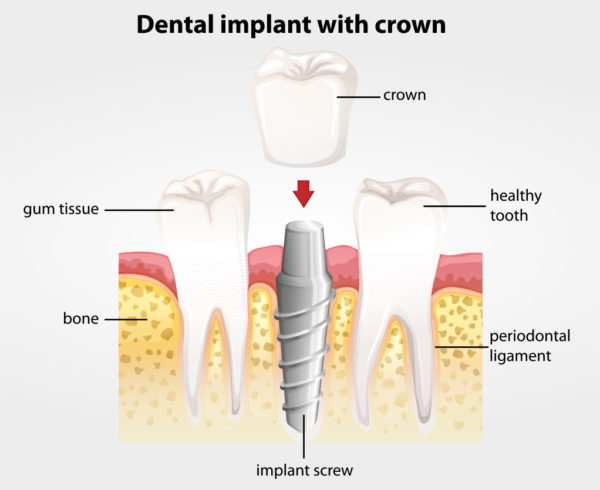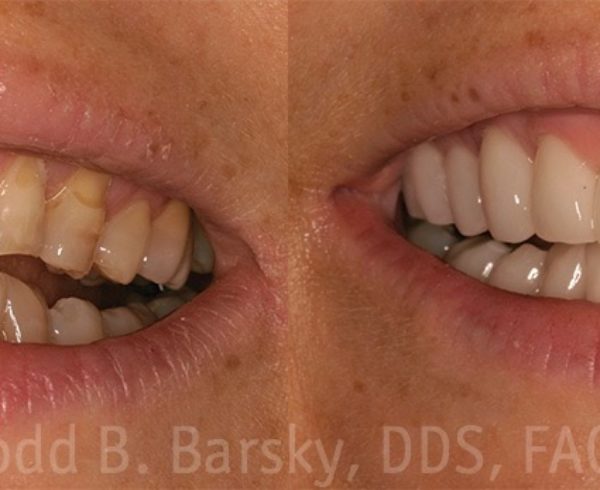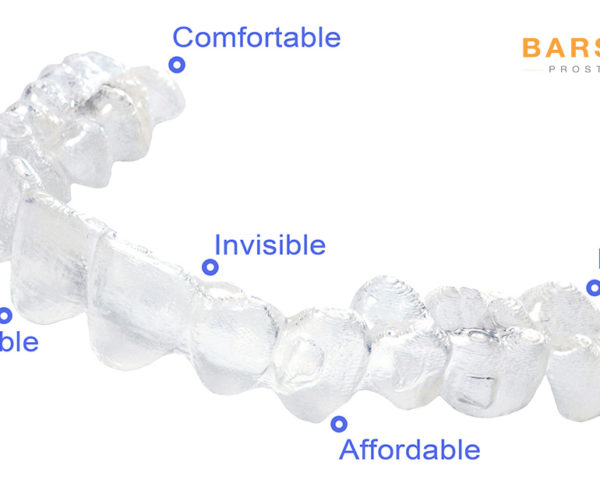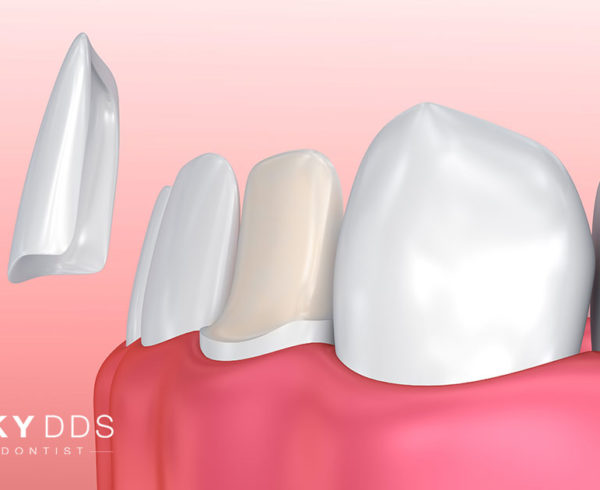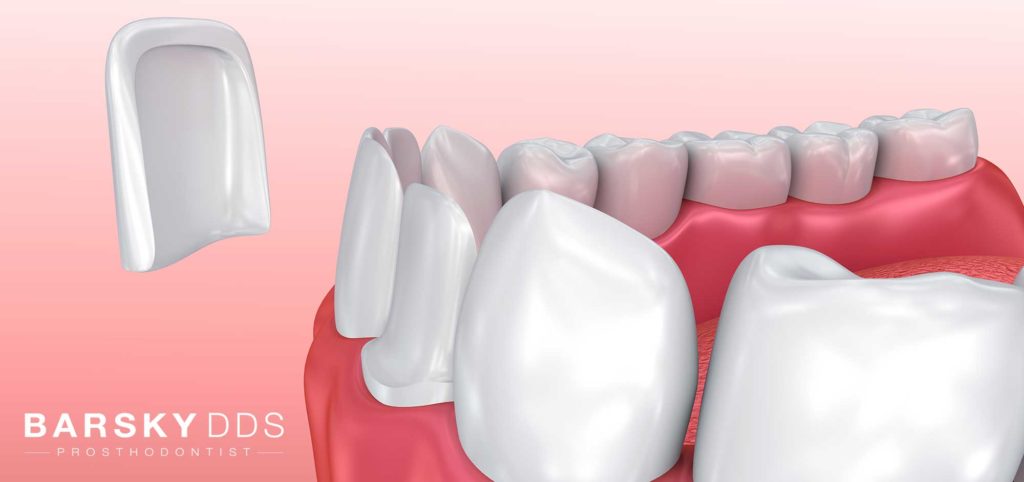
Veneer Teeth Illustration
Even the most diligent patients with optimal oral health may dislike certain elements of their smile. Cosmetic imperfections such as chips, cracks, discoloration, or misaligned teeth can be addressed with dental veneers. But how do you know if veneer teeth are the right option for you? With dozens of treatments in cosmetic dentistry, your choices can quickly become overwhelming.
Dr. Todd B. Barsky, a board certified prosthodontist in Miami, FL has composed this complete guide to veneer teeth so you can make a well-informed decision regarding your cosmetic dental treatment.
What are Veneer Teeth?
Veneer teeth – or dental veneers – are ultra-thin, shell-like restorations that are affixed to the front surfaces of your natural teeth. One of the most common cosmetic treatments in dentistry, veneers can conceal a wide array of aesthetic imperfections. With modern advances in our field, veneers are more natural-looking and lifelike than ever before. Patients who choose veneers can enjoy a brighter, balanced, more symmetrical smile.
About Dental Veneers with Dr. Barsky
Different Types of Veneers
There are two types of veneers commonly used in dentistry. These include:
- Composite Resin: This type of veneer is minimally-invasive, cost-effective and lasts approximately five to seven years. Composite resin is the same material used when placing tooth-colored fillings. Because the natural tooth structure is left intact, composite veneers can be removed in the future if necessary. Composite resin can be color-matched to blend in with your surrounding teeth for a natural-looking outcome.
- Porcelain: Though porcelain veneers are costlier than their composite counterparts, they usually last up to 15 years with proper care. Crafted from high-grade ceramic porcelain, these restorations require slight reduction of the natural teeth.
Determining Your Candidacy for Veneers
Veneer teeth are cosmetic in nature. Therefore, it is important to have healthy teeth and gums before undergoing any aesthetic procedure. During an initial consultation, Dr. Barsky will determine whether veneers could be a treatment option for you.
Aside from an oral examination, x-rays and scans will also be taken to evaluate the health of the underlying bone and surrounding structures. Dr. Barsky will talk with you in detail about your dental concerns so he can create a personalized treatment plan that will effectively meet your needs.
Dental Veneers Before & After
Actual teeth veneer patient photos of Dr. Barsky, click here.

What Issues Can be Addressed with Veneers?
A variety of cosmetic issues can be addressed with veneer teeth. Some of these include:
- Chipped Teeth: Small chips, cracks, and fractures can be concealed with dental veneers for a more complete smile.
- Spaces Between the Teeth: Gaps or spaces between the teeth can be reduced or altogether eliminated with veneers.
- Misshapen Teeth: Veneers can change the shape of a tooth, widening or lengthening it as necessary, making it more aesthetically-pleasing.
- Tooth Erosion: Patients who grind their teeth may experience significant wear and tear. This type of erosion can often be addressed with veneers.
- Discolored Teeth: Certain types of dental stains do not respond to teeth whitening. Intrinsic stains – discoloration of the inner layers of a tooth – can be camouflaged with composite or porcelain veneers.
- Slightly Crooked Teeth: In many cases, misaligned teeth can be treated with veneers. By applying the veneer to the front of the tooth surface, it can give the illusion that the tooth is actually flush with the adjacent teeth.
Receiving Porcelain Veneers
If you are considering veneers, it is helpful to know what to expect the day of treatment. If you choose composite veneers, the straightforward procedure can usually be completed in under an hour. However, porcelain veneers require more steps.
If you choose porcelain veneers, here is what to anticipate:
- Prepping the Teeth: Small amounts of enamel will be removed from the front of the teeth.
Impressions: Dental impressions will be taken so a lab can fabricate your final crowns. - Fabrication of Final Veneers: Our trusted dental lab will carefully craft your new custom restorations. This process usually takes up to two weeks. In the meantime, Dr. Barsky can place temporary veneers to protect your teeth while you wait for the lab to complete your case.
- Placing the Final Veneers: When your final veneers arrive from the lab, we will schedule you for a second appointment in our office to have them placed. Using special dental bonding agents, Dr. Barsky will cement the veneers to your teeth.
- Final Adjustments: Once the veneers are in place, Dr. Barsky will check your bite and make any necessary adjustments.
The Advantages of Porcelain Veneer Teeth
Porcelain veneers are versatile and provide several benefits. Veneer teeth crafted from porcelain are:
- Stain-Resistant: Because of the high-grade materials used to craft your veneers, they will be resistant to staining from coffee, tea, red wine, and colas.
- Natural-Looking: Porcelain veneers are slightly translucent. They reflect light in a way that is similar to natural tooth enamel, providing an incredibly lifelike result.
- Minimally-Invasive: Small amounts of enamel must be removed in preparation for porcelain veneers. Even so, they are much less invasive than dental crowns, which cover the entire tooth.
- Cost-Effective: Although costlier than professional teeth whitening or composite bonding, porcelain veneers are typically more affordable than other cosmetic procedures such as dental crowns.
Are There Any Disadvantages to Porcelain Veneers?
The primary drawback to porcelain veneers is the fact that they are not reversible, as composite veneers are. Therefore, your natural teeth will never be in their original condition once porcelain veneers have been placed. Additionally, porcelain veneers must be crafted in a dental lab.
This process can take up to two weeks or even longer in some cases. Alternatively, composite veneers can be placed during one office visit.
How Much Do Veneers Cost?
The total cost of treatment will primarily depend on the number of teeth that must be treated. A patient who receives six veneers will pay less than a patient who receives 12. Another factor to consider is the material used. As aforementioned, composite veneers are typically more affordable than porcelain veneers.
Will Insurance Cover My Veneer Treatment?
Unfortunately, most dental insurance plans do not cover cosmetic procedures, including veneers. However, there are other financing options that can be provided in-office. Our team of financial experts will be happy to help you find a payment plan that will maximize your budget.
Maintaining Your Veneers
Routine dental examinations and cleanings are important for everyone, but they are especially important if you have veneers. By keeping regular dental appointments, we can monitor your progress and make sure there are no complications.
It is also important to develop a thorough oral hygiene routine so you can keep your smile healthy between visits. Our team can help you determine a regimen that will work for you.
Meet Dr. Barsky, Smile Architect
Schedule a Consultation with Us Today
If you are unhappy with certain aspects of your smile, veneer teeth could be an option for you. To find out if you qualify for this cosmetic treatment, schedule an appointment with Dr. Barsky. You can contact us online anytime, or call our office at (786) 542-1071.



